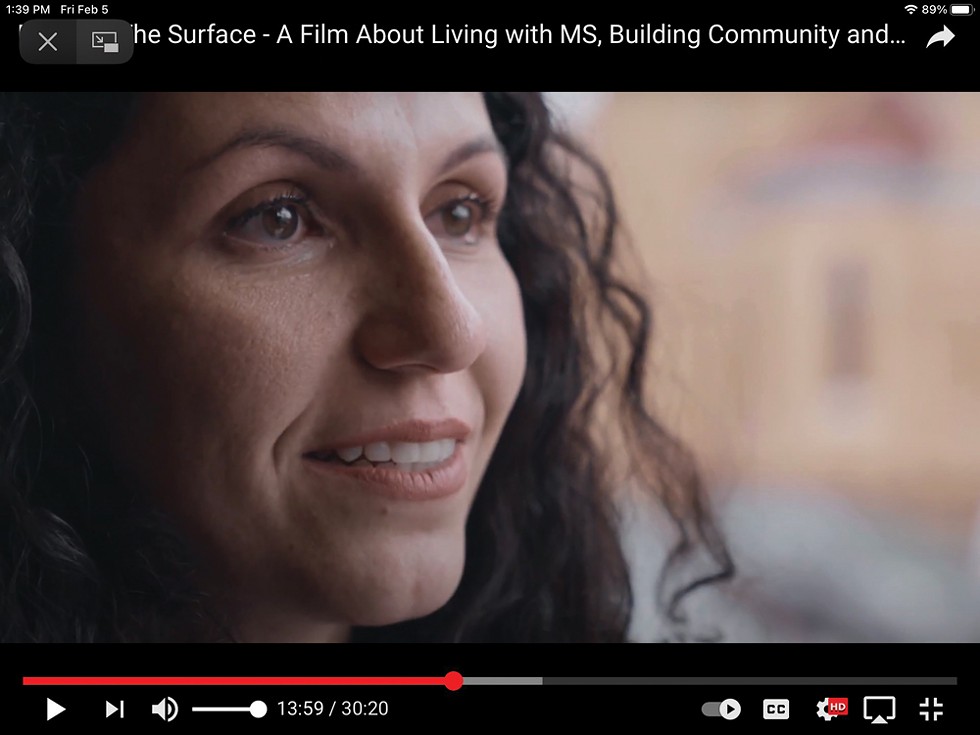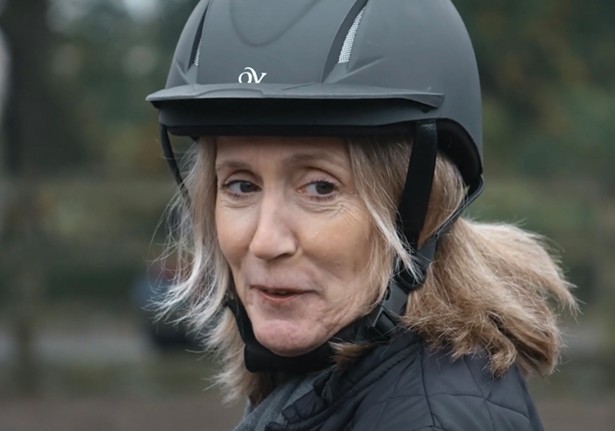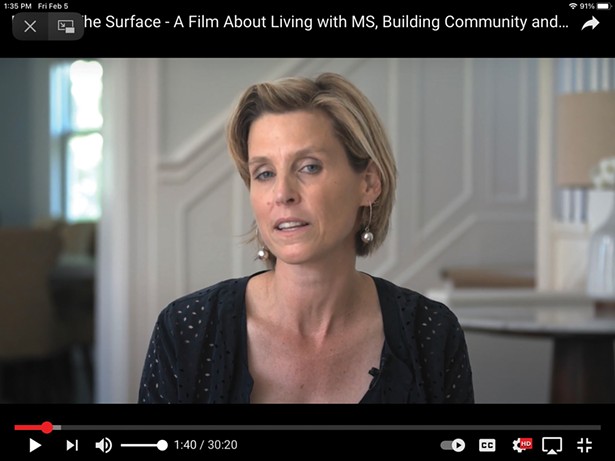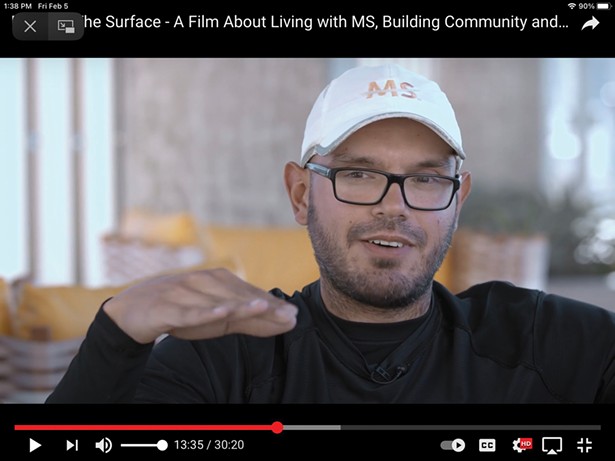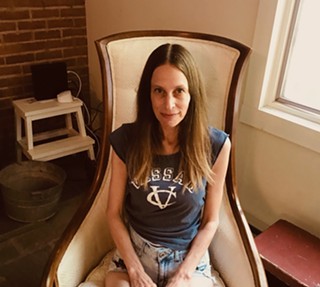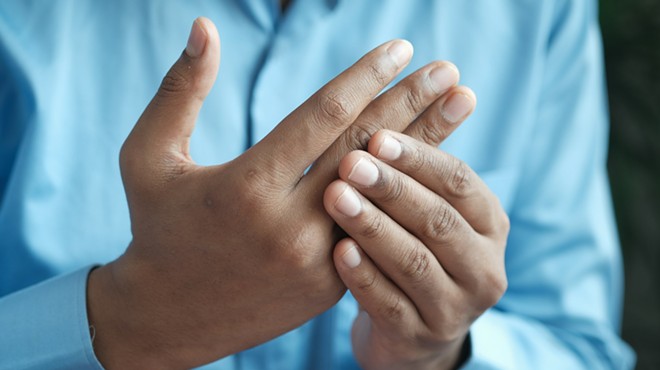Last December, it dawned on Marylou Kandur that it had been over nine months since the members of her Parkinson's disease support group had seen each other's faces. While many other groups had pivoted online after COVID hit back in March, her Rhinebeck Parkinson's Support Group—most of them senior citizens lacking in digital fluency—lagged behind. "Let me see if I can get these people together," thought Kandur, a retired entrepreneur in Red Hook who has had a manageable form of Parkinson's for 22 years. "But what will I say to them?"
Later, she was on her treadmill when a TV commercial came on for the 1946 Christmas film classic It's a Wonderful Life—reminding her of a famous scene where the angel, Clarence, grants the despairing protagonist, George, his wish to have "never been born." By making it so, Clarence helps George see the irreplaceable value of his life and want to stay alive. That's it, thought Kandur. She'd ask the support group members to ponder the effect their lives have had on others, and then meet online the next day for a lively discussion. It was a theme that perfectly matched her goal for the group since her first day as its facilitator: to keep people interested in living.
She phoned each member to gauge their interest, and many were game to try Zoom—including Kandur herself, who enlisted the help of a friend to navigate the platform. Despite the challenges (the group is seeking a tech support volunteer), the meeting was a virtual success. One by one, their faces popped up in gallery view like the vintage TV show "Hollywood Squares"—a small, grateful group gathered for purposeful conversation.
Finding Your People
Faced with a pandemic reality that hits its one-year anniversary this month, support groups of all kinds are getting creative to meet our digital moment. Their internet migration is not exactly new—it underscores a trend that has been gaining momentum since Facebook debuted in the mid-aughts. Proliferating on social media, Zoom, and other platforms, virtual forums and collectives across the globe connect people who are facing some of life's most difficult passages—illness, disability, grief, addiction, caregiver fatigue, heartbreak, trauma. "We have the ability in this day and age to find exactly what we need at the time we need it most—and that's the beauty of online, that you can find just the right people to connect with," says Kate Milliken, a Bronxville-based video producer who created the support community Moodify after she was diagnosed with relapsing remitting multiple sclerosis (MS) in 2006. "The emotional relatability bond, and the support you get from it, is crazy."
In COVID times, the move to all-virtual support groups has been a blessing and a gift for the very populations that need them most. For the chronically fatigued, having the world come to you—albeit pixelated—can be a sweet relief. For the less mobile, it's a break from negotiating wheelchairs, walkers, or canes. "I can get people to come that I've never had before," says Kandur, who finds that distance is no longer a factor in keeping folks away.
Even people who typically resist support groups tend to be more receptive to attending a meeting from the privacy and comfort of their own space. That's one of the findings from a 2019 study led by Columbia University Irving Medical Center neuropsychologist and researcher Victoria Leavitt, MD—who also found that a telehealth program called eSupport reduced loneliness and depressive symptoms in participants with multiple sclerosis. "Social support is a powerful tool for encouraging healthy behaviors," the study notes, "and our findings reveal that [people with MS] who have strong social networks are more likely to maintain involvement in physical and social leisure activities."
In many cases, support groups are taking this pandemic era as an opportunity to do support differently. While the Rhinebeck Parkinson's group used to convene for monthly meetings at the Starr Library and occasional social outings, they now have video calls the first Wednesday of the month that revolve around a theme designed to spark conversation. For the February meeting, Kandur circulated the 1927 Max Ehrmann poem "Desiderata" and asked participants to pick a line that resonated for them ("You are a child of the universe no less than the trees and the stars; you have a right to be here," reads one line). The key to making Zoom work, Kandur finds, is having an agenda. "People want to be led somewhere," she says—while the structure, and the inspirational topic, keep the conversation from descending into a negative spiral. "It's this aspect of bringing something to the room, so to speak, to make them concentrate on things that are not horrific."
Even before COVID, this was not your typical illness support group. When Kandur became the facilitator a couple of years ago, she thought, "I'm going to make this different, because I don't want to sit around discussing my aches and pains." She found an instructor who could teach the group Rock Steady Boxing, which is a type of boxing designed for people who have Parkinson's disease. And she helped engage speakers, such as a doctor who could educate the group about medical marijuana. "One of the things I've always loved about this group is that they will come up with ideas to help other people," she says. Once, at a pre-quarantine restaurant outing, a member with a bad tremor struggled to eat with a fork. "Screw it," they told him, "just eat with your hands!" The thought had never occurred to him, and it was just the solution he needed right then.
An Invaluable Exchange
The best kind of support group is one that gives you a sense of hope, says Beth Broun, a New York City transplant living in Mount Tremper, who has progressive MS. Since her diagnosis 10 years ago, Broun has been in just about every kind of support group there is. First, she formed a klatsch of working women in their 40s with MS, who met in midtown for lunchtime camaraderie. Later, she tried a more formal group out of HealthAlliance Hospital in Kingston—the kind where people sit with their spouses around a table in a board room, fortified by coffee and snacks. And she's fairly doused herself in online support. "I'm in maybe six MS groups on Facebook for all the different medications," she says. "I'm in one called MS Warriors. I even became friends online with a man from the Netherlands who's got the same kind of MS I have."
Whether it's virtual or in-person, Broun finds that the exchange of information—and the spirit of people helping people—is what keeps her hooked on support groups. "People with MS are the only ones who really understand me," she says. "And I understand them, so we can actually be helpful to each other." Recently, she attended an online seminar where physicians spouted medical-speak about BTK inhibitors and other complicated medications that Broun didn't understand—so she called one of her bookish support group buddies and asked, "Can you dumb this down for me?" She's compared treatment notes with other people and shared information about clinical trials. And through her network, she's discovered great finds to improve her quality of life—like her new byACRE carbon-ultralight walker from Sweden. "It's the chic-est thing—it looks like a racecar," she says. Fellow support groupers have turned her onto foundations, like the Patients Access Network, that can help pay the staggering $3,500 copay for a medication she takes called Ampyra. "I learned about all these things through support groups," says Broun. "There's gold in them hills."
Perhaps the biggest support community she was a part of was Moodify, Kate Milliken's brainchild, which invited participants to post videos that captured their changing emotions throughout their chronic-illness journey. "I built a storytelling methodology that guides people to talk about how they feel," Milliken explains. "The first thing you have to do is tag yourself with one of 13 emotions. As a result of that choice, you end up becoming reflective. So, if you're really angry about your MS, it's hard to be angry when you're guided to talk about why. It's the idea of getting to see somebody emotionally go through a process, come out the other side, and be empowered." Participants could choose to keep their videos private, post them to the community, or make them public—and seeing others share their emotional vulnerability made many users feel less alone. Moodify started with MS, but other communities formed for conditions like chronic pain, mental health, epilepsy, spinal cord injury, stroke, and Lyme disease.
Though the online platform impacted the lives of many, Milliken struggled to find a revenue model, leading her to put the project on ice. But the connections have stuck and many Moodifiers remain bonded. Meanwhile, Milliken is in discussion with a few healthcare companies about using the storytelling technology for market research. And she created a film, Beneath the Surface, about meeting in person with some of the platform's super-users. "We had a doctor at Johns Hopkins do a study on our site, and people's sense of life purpose increased by over 30 percent and they had less suicidal thoughts," she says. "Peer-to-peer support is powerful and so undervalued."
Staying Motivated through Cyberspace
While platforms like Moodify are uber-innovative and creative, plenty of support groups don't try to reinvent the wheel in the digital realm—nor do they need to. Many have simply shifted their offerings online as best they can. That's the case for the Parkinson's Disease Support Group of the Mid-Hudson Valley, which is one of the longest-running support groups in the region, established in 1985. Like the Rhinebeck group, which is smaller and more localized, the Mid-Hudson Parkinson's Group arrived late to the digital party. While a small group of computer-savvy caregivers met online fairly early into quarantine, it wasn't until December that the group held a one-hour video call for its broader membership. "It was a pilot program, and it worked out really well," says Nancy Redken, the group's chair. "We had a little discussion session and then our dance therapist did five minutes of seated exercises, which are easy to do on Zoom. Then we had two mini presentations, including one from a board member who is an EMT and an 'Aware and Care' ambassador." (Aware and Care is the name of a kit created by the National Parkinson's Foundation that patients can take to the hospital with them to support their stay there.)
The Mid-Hudson group is a trove of resources for people with Parkinson's and their partners or caregivers—and going forward, Redkey believes they can offer more to their members online. From tai chi, qi gong, and Rock Steady boxing, to speech programs like the Lee Silverman Voice Treatment (LSVT Loud and LSVT Big), the group incorporates many evidence-based offerings and educational opportunities. "It may sound hokey, but we start every meeting by singing 'Happy Birthday' to anyone who's had a birthday that month, because singing is one of the best things you can do to exercise your vocal cords and facial muscles [which can be affected by Parkinson's]," says Redkey. It also builds community, which is key. "It's easy for older people to start dropping some of their important contacts," she adds. "If you have a progressive, chronic disease on top of that for which there is no cure, it's pretty hard to keep motivated. That can turn into a descending spiral that's very hard to break." That's why the group focuses on empowering its membership to feel like a part of the solution. This September, they hope to host their annual walk on the Walkway Over the Hudson to celebrate their 35th anniversary (postponed last year due to COVID).
It's those in-person gatherings that support groups miss the most, and that feel irreplaceable in our pandemic times. For now, Zoom can fill at least part of that gap, thanks to the efforts of a few dedicated social connectors. "I would just like to make people's lives a little happier if I could," says Kandur. "That's really all this is."
RESOURCES
Rhinebeck Parkinson's Support Group (845) 663-3974







